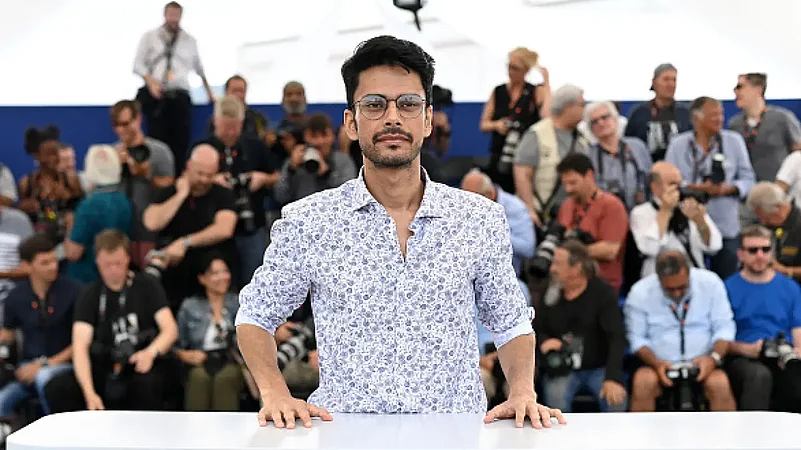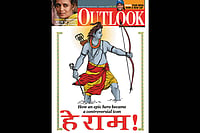When filmmaker Shaunak Sen decided to make a film that went on to become All That Breathes that won the 2022 L’Oeil d’Or (Golden Eye) for the best documentary at Cannes Film Festival, he let the textures in the skies guide him. He took in the constant greyness from November to January and the tactile air quality, also “opaque and nauseous”, in which these tiny dots, birds, would glide and fall from the skies. It felt apocalyptic. It made him think of human-animal relationships, the hypnotic trans species love, of people with a deep, profound love and engagement with birds.
Sen went in search of real-life examples and chanced upon brothers Nadeem Shahzad and Mohammad Saud who run Wildlife Rescue at Wazirabad Village. The duo rehabilitates injured raptors, especially black kites that fall unconscious, having suffocated on the air pollutants. “The minute I met them at their remarkable, small damp basement, with industrial decay on one side and the beautiful regal birds on the other, I immediately understood this is an inherently cinematic space. I decided to shoot them, and from there it became a free-fall, within incredible momentum that went on for the next three years,” Sen tells Outlook.
The 93-minute documentary took three years of showing up every day at the dingy basement. Before the Cannes win, 'All That Breathes' became the first Indian film to win the World Cinema Grand Jury Prize at the Sundance International Film Festival in January 2022.
Sen, 34, is a Delhi-based film scholar, with a PhD from Jawaharlal Nehru University, and a mass communication degree from A.J.K MCRC Jamia Millia. In terms of the film’s visual language, he adapted to the space and script to devise specific styles of filming. To capture the simultaneity and co-existence of non-human life in the city, German cinematographer Ben Bernhard, inserted signature slow takes, tilts, pans and so on, he had previously employed in the films of Russian director Viktor Kossososki, Sen’s role model. “Like the beginning scene of rats, then turtles, snail and so on… essentially the shot juxtaposes some element of the urban, and you stay with the animal in an uncut, unfettered durational experience of these long shots.”

Secondly, voiceovers were incorporated to avoid “an observational kind of sociological documentary” and also include the brothers’ childhood fascination with the black kites. Like the scene of a young bird being bathed in foamy water, with one brother telling the other “you are washing around its ears like mom used to”. “It is why we developed these dreamy, floaty stylised bits”. Besides, Sen had jotted down “wiser and more beautiful things” that the brothers had spoken, which were not part of the direct interview recordings. “I took out the best lines, compressed them, and cut these stylistically into voiceover bits,” says Sen.
Thirdly, due to the compact basement and the only so much that happened daily–the birds are brought in in boxes, treated in the tiny basement, and taken up to the enclosures on the terrace, and in time fly away–the crew, in time, knew what to expect. “We could predict the movements, the inner rhythms, and cadences, and developed poetic, flowy scenes. The idea was to use techniques of fiction storytelling in a non-fiction film, for filmmaking techniques like cranes, tracks, and sliders, were used because it was a small space with predictable movements.” The genre of non-fiction, finds Sen, is more accommodating to the personal interests of small-scale films. Once he got exposed to the documentary circuit of resource and fund raising, it was easy “to discover this world of creative non-fiction and get familiar with different grammars and vocabularies that are at play.” However, his next will be a fiction project, “because non-fiction is exhausting, and I can’t imagine putting in another three years for another film”.
Despite a reference to the 2019 CAA-NRC protests in Delhi, where one of the brothers receives a phone call to check if he’s okay, Sen says the film was not intended to be political. And that if you shoot a subject consistently for three years, happenings on the periphery of their lives will seep into your filming. “It is why there are no direct shots of any protest or unrest, yet this sense of something oblique and tangential, even though the brothers put their head down and continue doing their work still. In a way, it became a wallpaper of their lives.”
For Sen, an award is not his yardstick to measure success. “Success is receiving an email or a message from a person I admire”. More than winning the award, receiving it from jury chair, veteran Polish filmmaker Agnieszka Holland, was the bigger moment of glory at Cannes. “I have long admired her work, and cherished our long discussion on films,” he tells Outlook. Attending the special screening of 'Three Thousand Years of Longing' (2022) “sitting just one row ahead of (lead pair) Idris Elba and Tilda Swinton” felt like another win. The sense of happiness also extends to the protagonists of his film, brothers Nadeem and Saud, who came along to the premiere, and seeing their lives change for the better as an international organisation has expressed interest to fund their initiative.


























